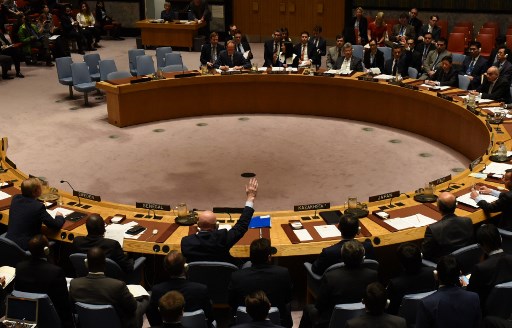
Russian Ambassador to the UN Vassily Nebenzia(raising his hand) voted no to the resolution. / AFP PHOTO / TIMOTHY A. CLARY
UNITED NATIONS, United States (AFP) – Russia on Friday cast a second veto in as many days at the UN Security Council to block the renewal of a UN-led investigation to identify the perpetrators of chemical weapons attacks in Syria.
A draft resolution put forward by Japan would have extended the Joint Investigative Mechanism (JIM) for 30 days to allow time for negotiations on a wider compromise.
But Russia used its veto power to prevent adoption after 12 council members voted in favor of the measure. China abstained, while Bolivia also voted no.
It was the 11th time that Russia has used its veto power to stop council action targeting its ally Syria.
After the vote, US Ambassador Nikki Haley told the council: “Russia has no interest in finding ground with the rest of this council to save the JIM.”
“Russia will not agree to any mechanism that might shine a spotlight on the use of chemical weapons by its ally, the Syrian regime,” she said.
“It’s as simple and shameful as that.”
The Japanese proposal came after Russia on Thursday vetoed a US-drafted resolution that would have allowed the expert investigators to continue their work for a year.
A separate Russian draft resolution that called for changes to the JIM failed to garner enough votes for adoption, with just four votes.
Pointless rollover
In Moscow, a senior foreign ministry official earlier said the 30-day technical rollover was pointless and that there was no need to take urgent action on the fate of the panel.
“We don’t see the point of a technical rollover,” Mikhail Ulyanov, head of the non-proliferation department at the foreign ministry, told RIA Novosti news agency.
“We can have consultations and if these turn out to be productive, then in some time, maybe not too far off, the Security Council can take a decision to renew the activities of the JIM,” he added.
“For the time being, there is absolutely no reason to rush.”
Russia has strongly criticized the JIM after its latest report blamed the Syrian air force for a sarin gas attack on the opposition-held village of Khan Sheikhun that left scores dead.
The April 4 attack triggered global outrage as images of dying children were shown worldwide, prompting the United States to launch missile strikes on a Syrian air base days later.
Syria has denied using chemical weapons, with backing from Russia, its main ally.
The draft Russian resolution would have put aside the findings of the panel on Khan Sheikhun to allow for another investigation of the deadly nerve agent attack.
The row over the fate of the chemical weapons inquiry came as the United Nations was preparing a new round of peace talks to open on November 28 in Geneva to try to end the six-year war.
The joint UN-Organisation for the Prohibition of Chemical Weapons (OPCW) panel was set up by Russia and the United States in 2015 and unanimously endorsed by the council, which renewed its mandate last year.
Previous reports by the JIM have found that Syrian government forces were responsible for chlorine attacks on three villages in 2014 and 2015, and that the Islamic State group used mustard gas in 2015.
© Agence France-Presse







